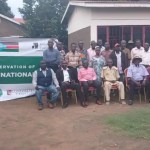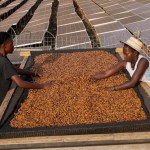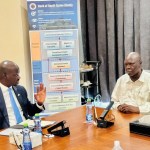(JUBA COUNTY) – Uganda’s top military commander held a closed meeting with South Sudanese President Salva Kiir on Saturday, as the two neighbouring countries attempt to steady a fragile security alliance following recent deadly clashes along their border.
Gen. Muhoozi Kainerugaba, Uganda’s Chief of Defence Forces, arrived in the South Sudanese capital early in the day and was received by the South Sudan People’s Defence Forces (SSPDF) Chief of General Staff, Gen. Dau Aturjong. The two military chiefs then proceeded to the presidential palace for the meeting with Kiir.
Officials said the discussions centred on security cooperation and coordination between the two armies. The talks took place just weeks after a violent confrontation in Kajo-Keji County, near the border, left several soldiers dead from both sides.
This is the second time in a week that a high-ranking Ugandan military delegation has travelled to Juba. Days earlier, Uganda’s Deputy Defence Chief, Lt. Gen. Sam Okiding, inspected Ugandan troops stationed in areas close to the capital.
Following his meeting with Kiir, Gen. Kainerugaba also held talks with Vice President for the Economic Cluster, Dr. Benjamin Bol Mel, to explore ways of enhancing cross-border security measures.
The Ugandan commander later travelled to Bilnyang village, the tactical base for Operation Milnzi Wa Kimya—translated from Swahili as “Silent Guardian.” Ugandan troops are stationed there under a bilateral security agreement with South Sudan. The operation began in March against the backdrop of renewed tensions between President Kiir and First Vice President Riek Machar. Details of the operation’s scope, mandate, and funding remain largely undisclosed.
Last week, the Awan Chan youth group, linked to Kiir’s ethnic community, claimed that Ugandan soldiers in South Sudan receive daily payments of 200 US dollars (equivalent to about 920,000 South Sudanese Pounds at current rates). Both Kampala and Juba have not confirmed this claim.
Uganda has been a significant security partner for South Sudan since 2013, when it deployed troops to support Kiir during the civil war against Machar’s forces. The conflict, which lasted five years, is estimated to have claimed around 400,000 lives before a peace deal was signed in 2018.
Despite public commitments to cooperation, the two nations continue to face disputes over their shared border. In 2022, Kampala and Juba agreed to demarcate the boundary. However, progress has stalled due to disagreements over reliance on colonial-era maps.


















































